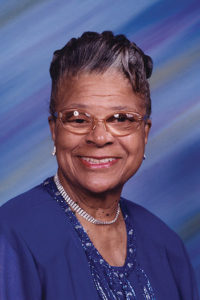
Gertrude Jeannette
*Gertrude Hadley Jeannette was born on this date in 1914. She was a Black playwright and film and stage actress.
Born Salley Gertrude Crawford Hadley in Urbana, Arkansas, her mother was a homemaker. Willis Lawrence Hadley, her father, taught at a Native American reservation near Spiro, Oklahoma. Jeannette had five brothers and one sister and grew up on a farm. The family moved to Little Rock, Arkansas, during the Great Depression, and she enrolled at the segregated Dunbar High School. She had plans to attend Fisk University. Her husband, Joe Jeannette II, first proposed to her on her prom night, and she refused, "walking off the floor."
Instead, they eloped in 1933 to New York City with him, a prizefighter and president of the Harlem Dusters, a motorcycle club. Her only son, Robert, was born in 1935 and died at age five. In 1935, she became the first woman to get a motorcycle license in New York City and joined her husband's motorcycle club. In 1942, she took and passed the cab driver's test and became the first female cab driver in New York City.
Using money she earned as a taxi driver, she enrolled in a speech class to help correct her stammer. The one class she could find was at the American Negro Theater in Harlem. The acting was part of the curriculum, and because of that, she studied along with notable actors such as Sidney Poitier, Ruby Dee, and Ossie Davis. "Singled out for her stage presence,” in 1945, she played her first lead role in Our Town. She continued to drive a cab until 1949 when she landed a role in Lost in the Stars, her first Broadway production.
In 1949, she was present at the Peekskill Riots when the Ku Klux Klan attempted to lynch Paul Robeson. Her husband worked as a bodyguard for Robeson, and during the riot, she and her husband rushed to the motorcycles to help get Robeson out.
She began writing plays 1950 about strong women that "no one would be ashamed to play." She wrote five plays, and as a "demanding" director, she mentored young Black actors in New York. Her first play was her favorite. It was titled The Way Forward, premiered in 1950, and related to her childhood. She also performed in the piece, which relates to being blacklisted during the Red Scare of the 1950s due to her association with her friend Paul Robeson, who was also blacklisted. Even though censored, she set up several theater companies in Harlem. Her husband, Joe Jeannette, died in 1956.
In the 1960s and 1970s, she appeared in several Broadway theater productions. Among them were The Long Dream (1960), Nobody Loves an Albatross (1963), The Amen Corner (1965), The Skin of Our Teeth (1975), and Vieux Carré (1977). In 1970, she appeared in the film Cotton Comes to Harlem, and in 1972, she appeared in the film Black Girl. Her film credits also include Shaft. 1979, she founded the H.A.D.L.E.Y. Players (Harlem Artist’s Development League Especially for You). She also acted into her 80s, retiring from directing at age 98.
She was one of several prominent African American theater directors featured in the 13-minute documentary Drama Mamas: Black Women Theatre Directors In the Spotlight and Remembered, shown at the Reel Sisters of the Diaspora Film Festival in Brooklyn in March 2006. She turned 100 in 2014. Gertrude Hadley Jeannette died on April 4, 2018, at 103, at her home in Harlem. Many nephews and nieces survived her.
